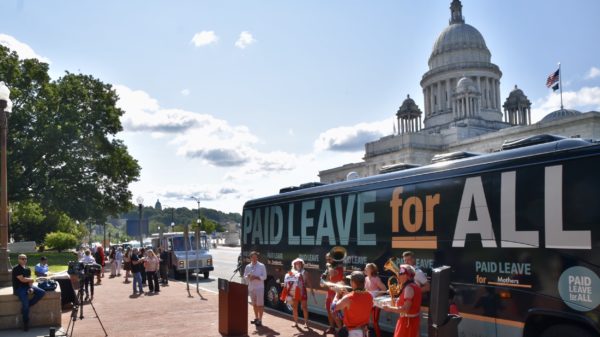
Washington’s workers, families, and businesses are fortunate to have paid family and medical leave (PFML). Our state’s Paid Leave program provides 12 to 18 weeks of benefits for parents welcoming a new child, workers coping with a serious health condition or caring for ill loved ones, and people dealing with a family member’s military deployment.
Our state program launched in January 2020 shortly before the pandemic upended our lives. Throughout these past difficult months, PFML has supported family economic security, promoted better health outcomes, and reduced anxiety. It also improves health, morale, and productivity in the workplace, making it popular with employers as well as their workers. And because the program is run by Washington State and funded through small payroll premiums contributed by both employees and employers, workers in the smallest companies and with the lowest wages now have access to benefits that formerly were mostly provided only by big businesses to their top employees.
About 30,000 Washingtonians are now receiving benefits each week, including one of my coworkers, who is caring for her father through his last months of life, and my own son and daughter-in-law, whose first child was born this spring. PFML is in addition to paid sick leave, which is also a minimum benefit requirement for most Washington workers, and any other employer-provided vacation or PTO.
Unfortunately, most people in the U.S. still don’t have any guaranteed rights to paid leave. Only six other states have fully operating PFML programs, with three additional states in the process of setting up programs.[1] That means my niece in Indiana was forced to be back at work before she was fully recovered from a C-section, let alone ready to put her tiny newborn in fulltime child care – and she was one of the lucky ones whose employer provided a few weeks of paid maternity leave. All across the country, everyday exhausted, hurting people drag themselves to work when a loved one needs their care, or before they’ve healed from childbirth or surgery or chemotherapy so they can pay their bills.
Enacting a national Paid Family and Medical Leave policy is one of the many reasons why Congress must act quickly to finalize and pass the care infrastructure package, which also provides major investments in childcare and pre-K access, long-term care, health care, college affordability, and other essential family economic security needs, all paid for with increased taxes on the wealthiest individuals and corporations. Both the Senate and House have now passed a reconciliation resolution outlining these priorities. Congressional committees are now working out the policy details.
In order to build a national PFML policy that truly supports the health and economic security of all our people and communities – without reinforcing the racial and gender inequities – it is important for Congress to apply the lessons we’ve learned from state programs.
A comprehensive, inclusive, and equitable PFML program requires:
- ensuring all workers have access, regardless of where they live or work, including part-time, gig, and self-employed people;
- providing progressive and sufficiently high wage replacement so that minimum wage and moderate income workers can afford to take the leave they need to heal and support their families;
- covering parental, medical, and family care leave equally, and including all types of families;
- keeping the application process simple and accessible; and
- protecting workers from retaliation or interference from employers.
The national PFML policy must also protect the hard-won benefits already established here in Washington and other pioneering states. Fortunately, several members of Washington’s Congressional delegation hold key positions of influence and understand this need, including Senator Patty Murray and Members of Congress Pramila Jayapal and Suzan DelBene.
The model now being discussed in Congress would allow states with comprehensive programs like Washington to continue operating, providing both the minimum federal benefits, plus any state benefits that are more generous. For instance, the federal PFML programs proposed by President Biden and the House Ways & Means Committee chairman Neal cover 12 weeks of leave, while Washington’s program in some cases offers up to 18 weeks. Washington’s benefit levels are also likely to be a little higher than through the national program. Washington workers would apply for and receive combined federal and state benefits all at once through the state. The federal government would reimburse Washington’s program for the federal portion of benefits, so workers and businesses here will see the payroll premiums they pay now go down.
The Congressional Care Infrastructure package contains precisely the investments we need to restore economic security to working and middle class Americans, provide opportunity for all our young people, create greater gender and racial justice, and build an economy where we can all thrive together.
Endnotes
[1] CA, NJ, RI, NY, DC, and MA have fully operating programs. CT, OR, and CO have adopted and are setting up programs. WA’s program passed the legislature in 2017 and began providing benefits in 2020.
More To Read
November 21, 2023
Why I’m grateful for Washington’s expanded Paid Family & Medical Leave
This one is personal.
June 29, 2023
How Washington’s Paid Leave Benefits Queer and BIPOC Families
Under PFML, Chosen Family is Family
February 10, 2023
Thirty Years of FMLA, How Many More Till We Pass Paid Leave for All?
The U.S. is overdue for a federal paid leave policy
